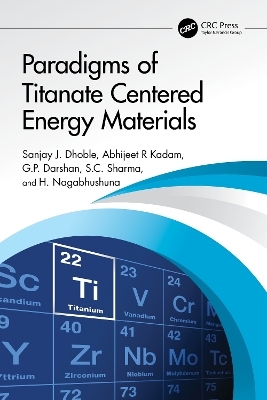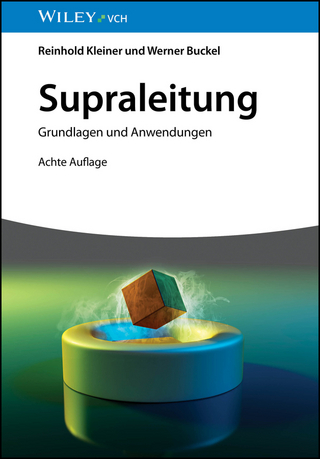
Paradigms of Titanate Centered Energy Materials
CRC Press (Verlag)
978-1-032-46484-8 (ISBN)
- Lieferbar (Termin unbekannt)
- Versandkostenfrei
- Auch auf Rechnung
- Artikel merken
Titanate-centered perovskites are an important class of crystalline materials with outstanding structural and property tunability. Recently, titanate perovskites have been extensively investigated as new-generation materials for various energy-allied applications, together with photovoltaic cells, light emitting diodes, photo detectors and lasers, for their exceptional optical and electronic properties. With increasing attention on the development of nanotechnology and multidisciplinary research, scientists have been trying to downscale the titanate perovskite structures into the nanoregime, so as to further boost their performances and applications. Compared with bulk perovskite materials, perovskite nanomaterials exhibit a series of advantages, such as fabrication of thin films and flexible devices and PNMs display high process ability. Perovskite nanomaterials feature rich and controllable facets and active sites. Besides benefiting from the small-size effect and quantum effect, perovskite nanomaterials are endowed with outstanding photo-electromagnetic properties. Furthermore, the applications of titanate-centered perovskites in the fields of energy, environment, WLEDs, forensic science and piezoelectric devices will be reviewed. This book will also discuss the possible solutions to the problems in their application by optimizing their compositions, structures and preparation methods.
This book will systematically summarize the key points in the design, synthesis, property improvements and application expansion of titanate-centered perovskites. The different perovskite structures and the rational design of functional materials will be discussed in detail. The advantages, disadvantages and experimental parameters of different synthesis methods for titanate-centered perovskites will be reviewed. This book will also summarize some practical experiences in selecting suitable elements and designing multifunctional materials according to the mechanisms and principles of elements promoting the properties of perovskites by covering almost last 20 years of literature. At the end of this book, we will provide an outlook on the opportunities and challenges in the view of development in titanate-centered perovskites
The inclusive effectiveness and practicality of prospective titanate energy materials and systems are directly connected to many materials-related factors. This volume of book features totally seven sections that envelop a wide range of titanate energy materials. They cover the modern developments involving materials for alternative and renewable energy sources and systems, including energy storage and batteries, nanocomposites, hydrogen, solar, wind, geothermal, biomass and nuclear. The book is a significant orientation for students and researchers (from academics, but also industry) interested in understanding the properties of emerging titanate energy materials and challenges in the recent era.
Prof. Sanjay J. Dhoble obtained his M.Sc. degree in Physics from Rani Durgavati University, Jabalpur, India in 1988. He obtained his Ph.D. degree in 1992 in Solid State Physics from Nagpur University, Nagpur, India. Dr. Dhoble is presently working as a Professor in the Department of Physics, Rashtrasant Tukadoji Maharaj Nagpur University, Nagpur, India. He has about 30 years of teaching at undergraduate and post graduate level and 29 years research experience. Consecutively in the years 2020 and 2021. Dr. Dhoble stands among the "Top 2% Scientists in the World" in the prestigious list published by a team of scientists in US' Stanford University, in one of the highly rated journals, PLOS Biology. Best Research Award-2016, for the outstanding contribution in the field of research and related extenuation activity for the University, presented by R.T.M. Nagpur University, Nagpur, India on 5th Sept 2016. He is also a recipient of India’s Top Faculty Research Award-2018 by Careers 360, for the top ten researchers in India in Physics. During his research career, he has worked on the synthesis and characterization of solid-state lighting materials and phosphors for solar cell efficiency enhancement, as well as development of radiation dosimetry phosphors and biosynthesis of nanoparticle and their applications. Dr. Dhoble published 44 patents and few of them are already granted (Granted patents are 18: 01 South Korean, 12 Australian and 05 Indian). More than 717 research papers are published in Scopus indexing journals and his h-index is 37 and has 8131 citations on Scopus. Dr. Dhoble is an Editor of "Luminescence: The Journal of Biological and Chemical Luminescence", John Wiley & Sons Ltd. Publication. He is also a Fellow of the Luminescence Society of India (LSI) and Fellow of Maharashtra Academic of Sciences (MASc). Mr. Abhijeet R. Kadam is the research scholar at Department of Physics; OP Jindal University, Raigarh pursuing his Ph.D. in physics under the supervision of Dr. Girish C. Mishra and co-supervision of Dr. S. J. Dhoble. He completed his M.Sc. from Dr. Ambedkar college Deekshabhoomi Nagpur in 2018. Mr. Abhijeet R. Kadam also worked on major research project as a junior and senior research fellow entitled ‘‘Downshifting compatible nano materials for improving the spectral response of present and future generation solar cells’’ vide Letter no. [DST/NM/NS/2018/38(G) dated 16 JAN 2019] from June 2019 to March 2022. His area of interest includes photoluminescence, material science, nanomaterial synthesis, thermoluminescence dosimetry, Photovoltaic efficiency enhancement, Mercury extraction etc. He is a life member of Indian Science Congress Association (Membership No. L42203). During his research work he published 9 patents out of which 3 Australian patents, 1 South African patent and 1 Indian patent received grant. Mr. Kadam published 39 research papers out of which 37 papers are in Scopus indexed journal. He is Reviewer of many reputed publishing houses like Wiley, Elsevier, American Chemical Society etc. Moreover his 7 book chapters are published in reputed international books from NOVA Publications and Woodhead Publications (Elsevier). Dr. G. P. Darshan obtained his Ph.D. degree (Physics) from Bharathiar University (Coimbatore, India) in 2019. Presently working as an assistant Professor in Department of Physics, Faculty of Mathematical and Physical Sciences, MS Ramaiah University of Applied Sciences, Bangalore, India. He has more than 10 years of teaching and 8years of research experience. He contributed immensely towards the development of eco-friendly, low cost and efficient rare earth doped phosphors which have high luminous efficiency, low power consumption, long operational lifetime, durable and eco-friendly. The chemistry of metal oxides, silicates, molybdates, tungstates and various bio-compatible polymer host matrices was altered through rare earth doping for efficient light harvesting. Many of these could be potential commercial materials for industrial WLED’s applications. Dr. S. C. Sharma is presently working as Director, National Assessment and Accreditation Council. He is an eminent Professor and Researcher in the field of Mechanical Engineering. Under his guidance 29 sponsored projects were completed and 36 students were awarded with Ph.D. degree. He has authored/co-authored with 18 books and 8 book chapters. His research focused on Basic and Engineering aspects and worked on structural and mechanical properties of aluminum, zinc, graphite, cast iron based alloys and composites, corrosion behaviour, tensile strength, fracture toughness and heat treatment. Later, his work turned towards the advanced materials and their composites to meet the Industry needs. Nanomaterials and their composites prepared by his research group find latest applications in various disciplines. He is Member, Indian Ranking Society (IRS), New Delhi, Indian National Commission for Cooperation with UNESCO (INCCU), New Delhi, Life Member, Institute for Social & Economic Change, (ISEC) Bangalore, and he was in the Search Panel to select Vice Chancellors for Central and State supported universities. Dr. H. Nagabhushana obtained his M.Sc. degree in Physics from Bangalore University, Bangalore, India in 1998. He obtained his Ph.D. degree in 2003 on Solid State Physics from Bangalore University, Bangalore. Since 2015 he has worked as Chairman and Professor in the Department of Physics, Tumkur University, Tumkur, India. During his research career, he is involved in the synthesis and characterization of nanophosphors for the development of optoelectronic devices, anti-counterfeiting and Finger print applications. Dr. H. Nagabhushana published more than 430 research papers in international journals and more than 200 national journals. His academic achievement includes best research paper awards for more than 20 research papers in conferences and reviewer of more than 100 international journals. He has a teaching experience of 20 years and has visited various countries. He has successfully guided 30 students for Ph.D. degree and completed 9 research projects. He is a co-author of 15 books/Chapters. He is the Editorial board member of various journals. He is life member of Luminescence Society of India, Electrochemical Society of India, Material Research Society of India.
1. Introduction 2. Energy Materials 3. Synthesis of Titanate Materials 4. Titanate Materials 5. Applications of Titanate Materials 6. Challenges Ahead 7. Concluding Remarks and Future Perspective
| Erscheinungsdatum | 11.07.2023 |
|---|---|
| Zusatzinfo | 13 Tables, black and white; 18 Line drawings, color; 26 Halftones, color; 3 Halftones, black and white; 44 Illustrations, color; 3 Illustrations, black and white |
| Verlagsort | London |
| Sprache | englisch |
| Maße | 156 x 234 mm |
| Gewicht | 453 g |
| Themenwelt | Naturwissenschaften ► Physik / Astronomie ► Atom- / Kern- / Molekularphysik |
| Technik ► Maschinenbau | |
| ISBN-10 | 1-032-46484-4 / 1032464844 |
| ISBN-13 | 978-1-032-46484-8 / 9781032464848 |
| Zustand | Neuware |
| Informationen gemäß Produktsicherheitsverordnung (GPSR) | |
| Haben Sie eine Frage zum Produkt? |
aus dem Bereich


